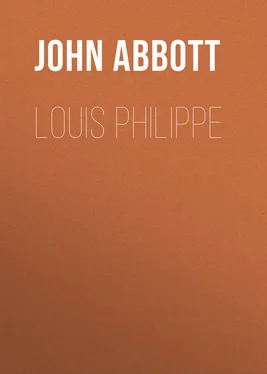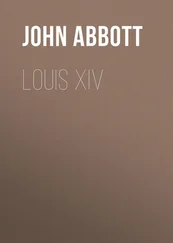John Abbott - Louis Philippe
Здесь есть возможность читать онлайн «John Abbott - Louis Philippe» — ознакомительный отрывок электронной книги совершенно бесплатно, а после прочтения отрывка купить полную версию. В некоторых случаях можно слушать аудио, скачать через торрент в формате fb2 и присутствует краткое содержание. ISBN: , Жанр: foreign_antique, foreign_prose, Историческая проза, на английском языке. Описание произведения, (предисловие) а так же отзывы посетителей доступны на портале библиотеки ЛибКат.
- Название:Louis Philippe
- Автор:
- Жанр:
- Год:неизвестен
- ISBN:http://www.gutenberg.org/ebooks/28199
- Рейтинг книги:5 / 5. Голосов: 1
-
Избранное:Добавить в избранное
- Отзывы:
-
Ваша оценка:
- 100
- 1
- 2
- 3
- 4
- 5
Louis Philippe: краткое содержание, описание и аннотация
Предлагаем к чтению аннотацию, описание, краткое содержание или предисловие (зависит от того, что написал сам автор книги «Louis Philippe»). Если вы не нашли необходимую информацию о книге — напишите в комментариях, мы постараемся отыскать её.
Louis Philippe — читать онлайн ознакомительный отрывок
Ниже представлен текст книги, разбитый по страницам. Система сохранения места последней прочитанной страницы, позволяет с удобством читать онлайн бесплатно книгу «Louis Philippe», без необходимости каждый раз заново искать на чём Вы остановились. Поставьте закладку, и сможете в любой момент перейти на страницу, на которой закончили чтение.
Интервал:
Закладка:
"I am incompetent to give your father any advice. Our positions are dissimilar. I myself seek redress for personal injuries. Your father, the Duke of Orleans, ought to obey the dictates of his conscience as a prince, and the dictates of duty as a citizen."
Decision of the Duke of Orleans.
This undecided answer led the Duke of Orleans to the decision that, in the prominent position which he occupied as a citizen of rank and wealth, he could not with honor abandon his country in her hour of peril. The Duke of Chartres desisted from any further solicitation, and, oppressed with much anxiety, returned to the army.
Origin of the Tri-color.
The badge of the Bourbons was a white banner. The insurgents, if we may so call the opponents, of all varieties of opinions, who assailed the ancient despotism, at the siege of the Bastile, wore red cockades. But very many were in favor of monarchy who were also in favor of constitutional liberty. Blue had been, in ancient times, the royal color, and they adopted that. Others, who were in favor of the Bourbons, and advocated reform only, not revolution, adopted white, the livery of the Bourbons. Thus arose the celebrated tri-color flag, which became the emblem of all in France who adopted the principles of political liberalism, whether monarchists or republicans. The white banner of the Bourbons and the tri-color of the revolutionists thus became arrayed against each other.
It was well known that there was a strong party in favor of placing the Duke of Orleans upon the throne. The king was awaiting his trial in the Temple. The monarchy was virtually overthrown, and a republic was established. The Republicans were in great fear of a reaction, which might re-establish the throne in favor of the Orleans family. It was, therefore, proposed in the Assembly that the Duke of Orleans and his sons should be banished from France. But it could not be denied that the Duke of Orleans had been one of the most prominent leaders in the revolution. He had given all his influence, and consecrated his immense wealth, to the cause. He had made great sacrifices, and had alienated himself entirely from the royal family, and from the nobility generally, by his bold advocacy of democratic principles. Under these circumstances, it seemed peculiarly ungrateful to proscribe and persecute him, merely because the blood of the Bourbons flowed in his veins, and because he was born near the throne.
The Decree of Banishment.
After a violent discussion in the Assembly, the decree of banishment was passed. But the friends of the duke rallied, and succeeded, after a struggle of two days, in obtaining a reversal of the decree. It was known that the Duke of Chartres had urged his father to yield to the decree, and to retire from France. This increased the suspicion that the Duke of Chartres was not friendly to the new state of things in republican, anarchic, France.
"It can not be denied," says a French historian, "that upon this occasion the young prince evinced that high sagacity which, by foreseeing events, succeeds in dispersing their dangers. He looked upon it that the revocation of the decree of banishment against his family was a great misfortune; because the name of Orleans having been once pronounced suspected and dangerous, could never again be useful to their country, and would be infallibly persecuted. 'If we can no longer be useful,' said he, 'and if we only give occasion of offense, can we hesitate in expatriating ourselves?'"
Battle of Nerwinde.
But, as we have said, the duke decided to remain at his post; and his son, returning to the army, anxiously awaited events. The Austrians speedily filled up their depleted ranks with reinforcements, and on the 18th of March, 1793, were again in battle array near the village of Nerwinde. Another terrible battle ensued, in which the Duke of Orleans again won many laurels; but victory decided against the French. The army of Dumouriez was utterly routed. The Duke of Chartres had a horse shot from under him; but he spent the whole night upon the field, struggling to rally the fugitives. It was attributed to his heroism that the army did not, on that occasion, experience an irreparable disaster.
General Dumouriez now found himself in the most painful and perilous position. It was not safe for any leader of the Republican armies to allow himself to be defeated. The loss of a battle was considered equivalent to treason. A committee was sent by the Assembly to spy out his conduct. The Moniteur of the 27th of March, 1793, contains the following report:
Charges against Dumouriez.
"We arrived at Tournay on Tuesday, the 26th. Citizen Proly – who was previously known to General Dumouriez – waited upon him. He found him at the house of Madame Sillery, in company with that lady, the Misses Egalité, and Pamela. He was attended, also, by Generals Valence and Chartres.
"Among other unbecoming observations, which he did not hesitate to make, General Dumouriez said that the Convention was the cause of all the misfortunes of France; that it was composed of 745 tyrants, all regicides; that he was strong enough to bring them to a sense of propriety; and that, if they were to call him Cæsar, Cromwell, or Monk, he was still resolved to save his country."
The publication of this report rendered it certain to Dumouriez and his friends that he would immediately be arrested and conveyed to Paris, under circumstances which would render condemnation and execution inevitable. He had not an hour to lose. He was supping with the Duke of Chartres, anxiously conversing upon the peril in which they both were involved, when a courier arrived, summoning him immediately to repair to Paris to explain his conduct to the Convention. The Duke of Chartres said sadly to his general: "This order is your death-warrant." As he said this, the general was opening another document, and replied: "Now it is your turn, my young friend; this letter incloses a similar invitation for you."
The Flight.
They both mounted their horses, and bidding adieu to unhappy France, set out, with a small retinue, for the frontier. A detachment of dragoons was sent in pursuit of them. By the extraordinary sagacity and self-possession of Baudoin, the faithful servant of the prince, they effected their escape. It is altogether probable that Dumouriez was intending, by the aid of the army, to overthrow the Convention, and re-establish the throne in favor of the Duke of Chartres. An anonymous French writer, commenting upon these events, says:
Supposed Plan of Dumouriez.
"We do not hesitate to place among the number of the plans of Dumouriez a project which did him honor – that of abolishing the republican system and erecting a constitutional monarchy in favor of the Duke of Chartres. Many persons have imagined that the Duke of Chartres was aware of this design. It is certain that in the army, as well as among the moderates of the interior, the prince would have found a crowd of adherents. But he was too conscientious to usurp a crown which had just fallen in blood – too good a son to authorize proceedings which would have endangered the life of his father; in short, too enlightened, too prudent, notwithstanding his extreme youth, to be instrumental in any ambitious or ill-conceived scheme emanating from such a man as Dumouriez. However, whether the Duke of Chartres was conscious or not of the designs of General Dumouriez, a stern necessity rendered a union of their fortunes indispensable for a time."
The fugitives repaired first to Mons, the head-quarters of the Austrians, to obtain their passports. Prince Charles urged the duke to enter the service of the Empire, and to co-operate with foreign armies and the emigrants in restoring monarchy to France. The duke emphatically declined. Indeed, such an act would probably have brought his father's head, and the head of every member of the family, within reach of the Convention, beneath the slide of the guillotine. Nothing now remained for the prince but exile and poverty.
Читать дальшеИнтервал:
Закладка:
Похожие книги на «Louis Philippe»
Представляем Вашему вниманию похожие книги на «Louis Philippe» списком для выбора. Мы отобрали схожую по названию и смыслу литературу в надежде предоставить читателям больше вариантов отыскать новые, интересные, ещё непрочитанные произведения.
Обсуждение, отзывы о книге «Louis Philippe» и просто собственные мнения читателей. Оставьте ваши комментарии, напишите, что Вы думаете о произведении, его смысле или главных героях. Укажите что конкретно понравилось, а что нет, и почему Вы так считаете.












